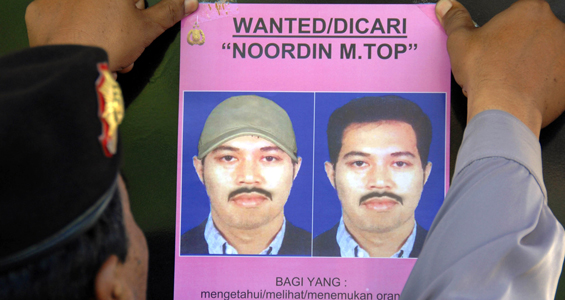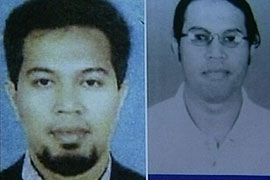Who was Noordin Mohammed Top?
Suspected planner of deadly bomb attacks dies in house raid.

 |
| Noordin Mohammed Top was one of Southeast Asia’s most wanted men [AFP] |
Noordin Mohammed Top, the suspected mastermind of twin suicide attacks on two hotels in the Indonesian capital of Jakarta, was killed in a raid on a house in the city of Solo in September, 2009.
Noordin, al-Qaeda’s representative in Southeast Asia, was the one of the region’s most wanted men.
The Malaysian was believed to have been a key figure in Jemaah Islamiyah (JI), which is fighting for an Islamic state in Southeast Asia, acting as a recruiter, strategist and financier for the group.
Noordin is said to have split from the group in 2003 and set up Tanzim Qaedat al-Jihad – or Organisation for the Base of Jihad – amid apparent differences over his policy of targeting civilians.
Indonesian security forces stepped up their hunt for the former accountant and mathematics teacher after he was identified as the prime suspect in the twin hotel bombings that killed nine people in Jakarta in July 2009.
After the attacks a message, purportedly from a group claiming to be “al-Qaeda in Indonesia” and apparently signed by Noordin, claimed to have carried out the attacks.
‘Money man’
 |
| Noordin Top is said to have been killed in a house raid in Java in September 2009 |
The 40-year-old was born in Johor, southern Malaysia, and completed a bachelor of science at the University of Technology Malaysia in 1991.
In 2001, he fled to Indonesia with Azahari Husin, a JI bombmaker, after the government in Kuala Lumpur launched a crackdown on Islamist fighters.
Intelligence officials say that on arriving in the country they began to recruit young Indonesians, some of them from Islamic boarding schools, for attacks they were planning to carry out.
Local newspapers described Noordin as the “money man” and Azahari as the “demolition man”.
The two were accused of planning the attacks on the JW Marriot hotel in Jakarta in 2003, which killed 12 people, the 2004 bombing on the Australian embassy, which killed at least nine, and the Bali bombings in 2002, which left more than 200 dead.
Azahari, an engineer and former university lecturer, was killed after troops from the elite Detachment 88 unit surrounded him in East Java in November 2005.
Death
The same counterterrorism unit killed Noordin in a similar raid on a house in Java.
Noordin was identified by his fingerprints after the bodies of at least four people were removed from the house.
Sidney Jones, the Southeast Asia programme director for the International Crisis Group, said Noordin’s death was “a huge blow for the extremist organisations in Indonesia and the region [because] there isn’t another radical leader in Indonesia who has given that same message so consistently”.
Close network
Noordin’s ability to elude security forces for years had led some Javanese to suggest that he must have magical powers or charms to protect him.
In 2006, he narrowly escaped a raid in Central Java in which two other fighters were killed.
He was reported to have been killed in a shootout with police in Indonesia’s Central Java region in August 2009 but the man killed turned out to be another suspect in the July 2009 bombings of the Ritz-Carlton and JW Marriot in Jakarta.
Police put his ability to remain elusive down to his reluctance to use mobile phones and his ability to rely on a close network of sympathisers who would act as couriers and keep his location secret.
Ken Conboy, a security consultant at Risk Management Advisory and author of several books on Indonesian security issues, said Noordin’s ability to recruit suicide bombers had been key to his cell’s success.
“He was able to get these usually village boys and convince them often in just a matter of days to give their lives,” he said.
But his skill in evading arrest and his network of sympathisers finally failed him on September 17, 2009, when Indonesian forces killed one of Southeast Asia’s most wanted men.